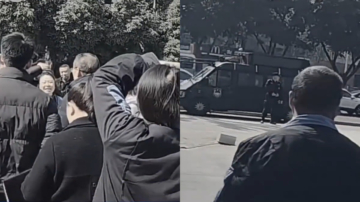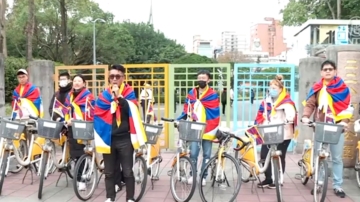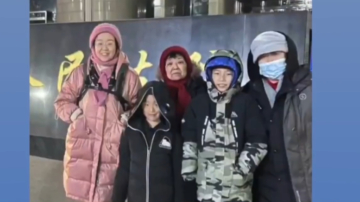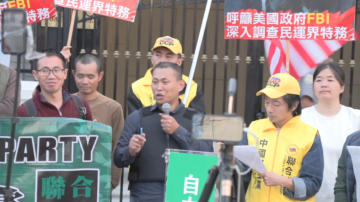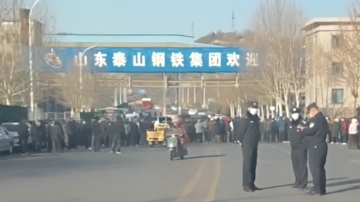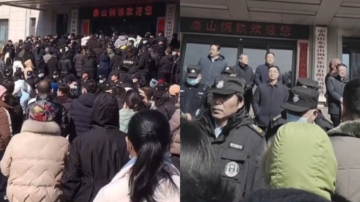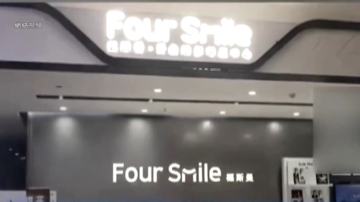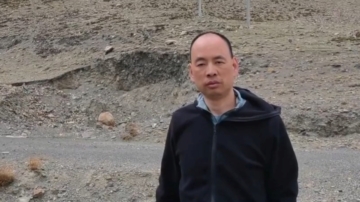【新唐人2012年11月21日讯】今年年中,河南周口市开展了大规模“刨祖坟”运动,已经“平迁200多万坟墓,复种耕地近3万亩”。“周口平坟”并不是孤立事件,在此之前,南阳等地也开展了平坟运动。在中国,有崇拜祖先的传统,坟墓占有很重要的地位。这起“周口平坟”事件迅速引发了各方关注。
周口市古称“周家口”,是伏羲的故都,老子的故里,素有“华夏先驱、九州圣迹”的美誉。不过,今年以来,河南省持续开展大规模“平坟运动”,各市县被铲平的坟墓数以百万计。一些学者迅速撰写了《呼吁书》,要求必须立即停止“这起严重侵犯信仰自由、破坏中国文化、伤害民众情感的野蛮行径。”
在《呼吁书》上的近三百名签单上,有秋风、蒋庆、吴飞等当代儒学复兴呼吁者,也有清华大学教授许章润、北京大学教授张千帆、作家崔卫平等自由派代表人物,甚至还有社科院学者于建嵘、律师丁锡奎这样的基层维权运动推动者,还有在校学生等各界人士。
大陆自由撰稿人朱欣欣:“土葬是民间的习俗,由来已久,中共所宣传的无神论这些观点只能代表它们一党的意识形态,不能强加于普通的民众。社会的文化习俗是自然孕育发展而来的,无论对于否,我们应该予以尊重。”
《呼吁书》指出,古往今来,中国人坚信“祖有功,宗有德”,主张“敬天法祖,报本反始”,故在亲人去世后必礼葬封坟、四时追祭﹔“死有所葬,入土为安”,乃是中国人所能设想的生命之最终归宿和最后诉求,是中国人奉行孝道的终极体现和最基本要求。“平坟运动”,人神共愤,法理不容!
呼吁书认为,中共历次的平坟运动,全盘摧毁了中国价值的基础,导致了今日中国之乱象!
事实上,过去六十多年来,中共曾发起多次“平坟运动”,周恩来就曾带头平了自己父亲和祖宗的坟。
不过,这次舆论界一致反对这场平坟运动。中共《人民日报》旗下的《环球时报》,就表达了“平坟运动可休矣”的立场﹔《南方周末》则质疑“平坟一定要简单粗暴吗?”此外,《人民网》、《新京报》等多家媒体,都发文表达了类似的态度。
民间也强烈对抗这种政策。周口地方施政者则以“停职、交纪委查处等方式威胁,还逼迫包括教师、公安、法官、干部在内的公职人员带头平坟,并将平坟成绩与考核、晋升挂钩,对不愿平坟的农民,一些地方威胁要停发低保、拘留甚至劳教。”
大陆自由撰稿人,原《河北人民广播电台》编辑朱欣欣表示,社会必须有民众和社会组织一起参加治理,而中共权力思维的习惯,却不考虑社会是与人民共有的。
大陆自由撰稿人朱欣欣:“专制体制一切以政治需求为出发点,它不考虑真正的文化传统、百姓的民意,它不会考虑这些问题。所以,这种体制把所有的和官方需求不一样的全部看作是自己的敌人。共产党不断的一代一代来培养自己的敌人,最后成了孤家寡人。”
事实上,中国的公共墓地价格急剧上升,动辄有报价几百万元的天价豪华坟墓被曝出,把昂贵的房价抛在了后面,火葬费也大幅攀升,民众发出“死不起”的感叹。
广东自由作家野火:“政府对坟墓的管理,它是集中管理,收费太昂贵,这是非常不好的。墓地按坪反算,是远远高过现在活人的土地。”
《法国国际广播电台》指出,让死人集中居住腾出墓地,与卖地决定地方财政的模式是一样的,在违背人伦天理背后,“平坟运动”所展示的是赤裸裸的利益逻辑。
采访/陈汉 编辑/宋风 后制/王明宇
Razing Ancestral Graves Widely Outrages Chinese
A large-scale “ancestral grave-razing” movement has been
launched in mid-year in Zhoukou city, Henan Province.
So far, “over 2 million graves have been leveled off,
leaving empty nearly 30,000 MU(5000acres) of arable land.”
For the Chinese Communist Party authorities,
this is not an isolated issue.
Earlier on, the same movement had taken place
in Nanyang city.
Reverence of ancestral graves is deemed an important
part of traditional Chinese culture.
The issue of ancestral grave-razing in Zhoukou has now
aroused wide and intense public attention.
Zhoukou is known as a capital of ancient China and
the birth place of Lao Zi, founder of Taoism.
In recent years, the province has launched a massive
and ongoing “ancestral grave-razing” movement.
So far, millions of graves have been razed in the province.
Some scholars called for an immediate stop
to be put to this official action.
In an open letter, they have said that this is “barbarism”,
that "it seriously violates freedom of belief,
and that it ruins traditional Chinese
culture, and hurts public feelings."
Nearly 300 people signed the appeal letter. The signatories
range from advocates for reviving Confucianism,
professors at Tsinghua University and Peking University,
along with many writers, scholars, lawyers and college students.
Zhu Xinxin (Freelancer in China):
“Coffin burial is an age-old folk custom in China.
The CCP's atheism is only its own party ideology,
which shouldn't be imposed on the general public.
Socio-cultural practices were naturally developed and
we should respect them.”
The appeal letter states that through ages, the Chinese
have esteemed ancestral virtue and revered the Heavens.
They hold rituals when putting deceased relatives
in the coffin and burying it underground.
Traditionally, the Chinese believe that in this way,
body is finally laid to rest.
The Chinese view it as the last wish of a human life,
and a practice of showing filial piety to elders.
The appeal has said that the “ancestral grave-razing”
movement has outraged human decency and Heaven, and that it violates legal order.
The appeal points out that the CCP's past grave-razing
movements destroyed the Chinese belief system, leading to social chaos in today's China.
During over 60 years of rule,, the CCP has launched
several “ancestral grave-razing” movements.
Zhou Enlai, CCP's former premier, once took the lead by
leveling off the graves of his father and his ancestors.
This time, China's media has unanimously opposed
the movement.
The Global Times, under the People's Daily newspaper,
has raised it's voice to stop the practice.
The Southern Weekend newspaper questioned, “Must
grave-razing go on in such simple and rude approach?”
Web version of the People's Daily, Beijing News and
other several media all shared the view.
Local public in Zhoukou strongly protested against this
official policy.
Local CCP authorities have forced civil servants
to take the lead in razing their ancestral graves.
They have been threatened with “suspension from duty”,
and are “undergoing investigation of the
discipline inspection commission”.
Even their salaries and promotion are affected by
their performance of grave-razing.
Those farmers who have resisted grave-razing have been
threatened with suspension of their subsistence allowance,
they are also threatened with detention and even with
being sent to reeducation through labor.
Zhu Xinxin comments that social administration should cover
the participation of citizens and of social organizations.
However, the CCP, with its power-struggle way of thinking,
never thinks society is for being shared with the people.
Zhu Xinxin: “Under it's dictatorship, the regime does
everything in order to meet the needs of securing its rule.
It never considers national traditions and public opinions.
So, such a ruling system views all dissenters as its enemies.
Over generations, the CCP has developed
its own enemies, and now ends up a loner.”
Public cemetery prices have soared in China.
Reportedly, some luxury cemeteries cost
millions of yuan, far exceeding the price of a house.
Cremation charges in China have skyrocketed, also
Civilians there said that they “cannot afford to die”.
Ye Huo (Freelancer in Guangdong): “China's public
cemetery is now under centralized management and with hefty fees, that's very bad.
Cemetery charges per square meter are far higher
than that of property for a living soul.”
Radio France Internationale reviewed that
centralization of graves to vacate more lands is logically the
same as that of selling lands to generate local fiscal revenue.
That is, besides violating human ethics, “the ancestral
grave-razing” movement embodies sheer pursuit of interest.
周口市古称“周家口”,是伏羲的故都,老子的故里,素有“华夏先驱、九州圣迹”的美誉。不过,今年以来,河南省持续开展大规模“平坟运动”,各市县被铲平的坟墓数以百万计。一些学者迅速撰写了《呼吁书》,要求必须立即停止“这起严重侵犯信仰自由、破坏中国文化、伤害民众情感的野蛮行径。”
在《呼吁书》上的近三百名签单上,有秋风、蒋庆、吴飞等当代儒学复兴呼吁者,也有清华大学教授许章润、北京大学教授张千帆、作家崔卫平等自由派代表人物,甚至还有社科院学者于建嵘、律师丁锡奎这样的基层维权运动推动者,还有在校学生等各界人士。
大陆自由撰稿人朱欣欣:“土葬是民间的习俗,由来已久,中共所宣传的无神论这些观点只能代表它们一党的意识形态,不能强加于普通的民众。社会的文化习俗是自然孕育发展而来的,无论对于否,我们应该予以尊重。”
《呼吁书》指出,古往今来,中国人坚信“祖有功,宗有德”,主张“敬天法祖,报本反始”,故在亲人去世后必礼葬封坟、四时追祭﹔“死有所葬,入土为安”,乃是中国人所能设想的生命之最终归宿和最后诉求,是中国人奉行孝道的终极体现和最基本要求。“平坟运动”,人神共愤,法理不容!
呼吁书认为,中共历次的平坟运动,全盘摧毁了中国价值的基础,导致了今日中国之乱象!
事实上,过去六十多年来,中共曾发起多次“平坟运动”,周恩来就曾带头平了自己父亲和祖宗的坟。
不过,这次舆论界一致反对这场平坟运动。中共《人民日报》旗下的《环球时报》,就表达了“平坟运动可休矣”的立场﹔《南方周末》则质疑“平坟一定要简单粗暴吗?”此外,《人民网》、《新京报》等多家媒体,都发文表达了类似的态度。
民间也强烈对抗这种政策。周口地方施政者则以“停职、交纪委查处等方式威胁,还逼迫包括教师、公安、法官、干部在内的公职人员带头平坟,并将平坟成绩与考核、晋升挂钩,对不愿平坟的农民,一些地方威胁要停发低保、拘留甚至劳教。”
大陆自由撰稿人,原《河北人民广播电台》编辑朱欣欣表示,社会必须有民众和社会组织一起参加治理,而中共权力思维的习惯,却不考虑社会是与人民共有的。
大陆自由撰稿人朱欣欣:“专制体制一切以政治需求为出发点,它不考虑真正的文化传统、百姓的民意,它不会考虑这些问题。所以,这种体制把所有的和官方需求不一样的全部看作是自己的敌人。共产党不断的一代一代来培养自己的敌人,最后成了孤家寡人。”
事实上,中国的公共墓地价格急剧上升,动辄有报价几百万元的天价豪华坟墓被曝出,把昂贵的房价抛在了后面,火葬费也大幅攀升,民众发出“死不起”的感叹。
广东自由作家野火:“政府对坟墓的管理,它是集中管理,收费太昂贵,这是非常不好的。墓地按坪反算,是远远高过现在活人的土地。”
《法国国际广播电台》指出,让死人集中居住腾出墓地,与卖地决定地方财政的模式是一样的,在违背人伦天理背后,“平坟运动”所展示的是赤裸裸的利益逻辑。
采访/陈汉 编辑/宋风 后制/王明宇
Razing Ancestral Graves Widely Outrages Chinese
A large-scale “ancestral grave-razing” movement has been
launched in mid-year in Zhoukou city, Henan Province.
So far, “over 2 million graves have been leveled off,
leaving empty nearly 30,000 MU(5000acres) of arable land.”
For the Chinese Communist Party authorities,
this is not an isolated issue.
Earlier on, the same movement had taken place
in Nanyang city.
Reverence of ancestral graves is deemed an important
part of traditional Chinese culture.
The issue of ancestral grave-razing in Zhoukou has now
aroused wide and intense public attention.
Zhoukou is known as a capital of ancient China and
the birth place of Lao Zi, founder of Taoism.
In recent years, the province has launched a massive
and ongoing “ancestral grave-razing” movement.
So far, millions of graves have been razed in the province.
Some scholars called for an immediate stop
to be put to this official action.
In an open letter, they have said that this is “barbarism”,
that "it seriously violates freedom of belief,
and that it ruins traditional Chinese
culture, and hurts public feelings."
Nearly 300 people signed the appeal letter. The signatories
range from advocates for reviving Confucianism,
professors at Tsinghua University and Peking University,
along with many writers, scholars, lawyers and college students.
Zhu Xinxin (Freelancer in China):
“Coffin burial is an age-old folk custom in China.
The CCP's atheism is only its own party ideology,
which shouldn't be imposed on the general public.
Socio-cultural practices were naturally developed and
we should respect them.”
The appeal letter states that through ages, the Chinese
have esteemed ancestral virtue and revered the Heavens.
They hold rituals when putting deceased relatives
in the coffin and burying it underground.
Traditionally, the Chinese believe that in this way,
body is finally laid to rest.
The Chinese view it as the last wish of a human life,
and a practice of showing filial piety to elders.
The appeal has said that the “ancestral grave-razing”
movement has outraged human decency and Heaven, and that it violates legal order.
The appeal points out that the CCP's past grave-razing
movements destroyed the Chinese belief system, leading to social chaos in today's China.
During over 60 years of rule,, the CCP has launched
several “ancestral grave-razing” movements.
Zhou Enlai, CCP's former premier, once took the lead by
leveling off the graves of his father and his ancestors.
This time, China's media has unanimously opposed
the movement.
The Global Times, under the People's Daily newspaper,
has raised it's voice to stop the practice.
The Southern Weekend newspaper questioned, “Must
grave-razing go on in such simple and rude approach?”
Web version of the People's Daily, Beijing News and
other several media all shared the view.
Local public in Zhoukou strongly protested against this
official policy.
Local CCP authorities have forced civil servants
to take the lead in razing their ancestral graves.
They have been threatened with “suspension from duty”,
and are “undergoing investigation of the
discipline inspection commission”.
Even their salaries and promotion are affected by
their performance of grave-razing.
Those farmers who have resisted grave-razing have been
threatened with suspension of their subsistence allowance,
they are also threatened with detention and even with
being sent to reeducation through labor.
Zhu Xinxin comments that social administration should cover
the participation of citizens and of social organizations.
However, the CCP, with its power-struggle way of thinking,
never thinks society is for being shared with the people.
Zhu Xinxin: “Under it's dictatorship, the regime does
everything in order to meet the needs of securing its rule.
It never considers national traditions and public opinions.
So, such a ruling system views all dissenters as its enemies.
Over generations, the CCP has developed
its own enemies, and now ends up a loner.”
Public cemetery prices have soared in China.
Reportedly, some luxury cemeteries cost
millions of yuan, far exceeding the price of a house.
Cremation charges in China have skyrocketed, also
Civilians there said that they “cannot afford to die”.
Ye Huo (Freelancer in Guangdong): “China's public
cemetery is now under centralized management and with hefty fees, that's very bad.
Cemetery charges per square meter are far higher
than that of property for a living soul.”
Radio France Internationale reviewed that
centralization of graves to vacate more lands is logically the
same as that of selling lands to generate local fiscal revenue.
That is, besides violating human ethics, “the ancestral
grave-razing” movement embodies sheer pursuit of interest.

